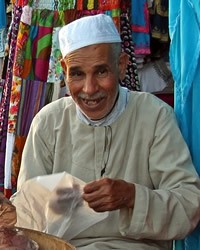Arabs represent the largest, most diverse, and most politically influential Muslim ethnic grouping in the world. While there are several characteristics that determine if a person is a true Arab, one trait is always evident: a proud sense of being an Arab. The early Islamic period was a time when "Arab identity" meant that all Arabs had descended from a common male ancestor. Thus, being an Arab brought recognition, honor and certain privileges. Their physical, geographical and religious aspects all vary greatly. However, the ability to speak Arabic (or an Arabic dialect) and identification with the Arabian cultural heritage are, perhaps, the two most essential elements. Arabs are the majority people in many countries in the Arabian Peninsula, the Maghreb, and all of North Africa. From there, Arab and Berber armies turned northward, and conquered the Iberian Peninsula (i. e., Spain and Portugal), and held all or part of it till 1492.
The Arabs in Morocco are far more influenced by Berber cultures than those from further east. With a relatively stable government and economy, there are fewer Moroccan Arabs looking for work in Europe than there are from other parts of the Arab world.
The Moroccan Arab diaspora in Europe is centered in urban centers where they usually hold low paying jobs. Germany is looking for skilled professionals to come to their country, especially medical doctors and industrial engineers and people with technology skills.
Instead of a Muslim culture, they have to interface with a secular-humanist culture. Moroccan Arab traditional family and tribal ties are breaking down. In Germany, there is greater freedom for women to leave the home, fewer arranged marriages, and less social pressure to conform to traditional religious practices. Women as well as men have greater educational and employment opportunities than they had in Morocco. These changes are bringing about much tension. Some Moroccan Arabs in Germany identify with their country of origin rather than being "Arab." Others socially mingle with Arabs from other parts of the Arab World. This is especially true for those who pray at the mosque.
Maintaining their identity while being surrounded by European culture is very important to Moroccan Arabs. It's hard to do in a secular culture.
It is difficult for Moroccan Arabs in secularized Europe to maintain their Islamic identity. To do this, they sometimes get more immersed in Muslim activities, and stay clear of the European culture around them. Secular humanism isn't a formal religious system, and it has very little appeal to Moroccan Arabs. Still, those who want to fit in with European culture probably become more secularized. It is hard to imagine where the Moroccan Arabs will be spiritually in a generation or two. Most likely, they will maintain their identity with Islam, but it will not affect their lives like it did in Morocco.
People who genuinely follow Christ will need to patiently and lovingly take the opportunity to take Christ to the Moroccan Arabs in Europe. They can do this in part by helping to teach language and work skills.
Pray that God will raise up faithful intercessors who will stand in the gap for Moroccan Arabs in Germany.
Pray that the softening of their traditional culture will soften their hearts so they will hunger for the truth and eagerly accept it when they hear it.
Pray for a church planting movement among Moroccan Arabic speaking people in Germany that will show others the transforming power of the gospel in their lives.
Ask the Lord to raise up strong local churches and Disciple Making Movements among Diaspora Arabs in Germany.
Scripture Prayers for the Arab, Moroccan in Germany.
https://www.bladi.net/l-allemagne-immigration-marocains.html#google_vignette
https://www.moroccoworldnews.com/2022/02/347335/moroccans-in-germany-mobilize-to-defend-moroccos-territorial-integrity
| Profile Source: Joshua Project |











